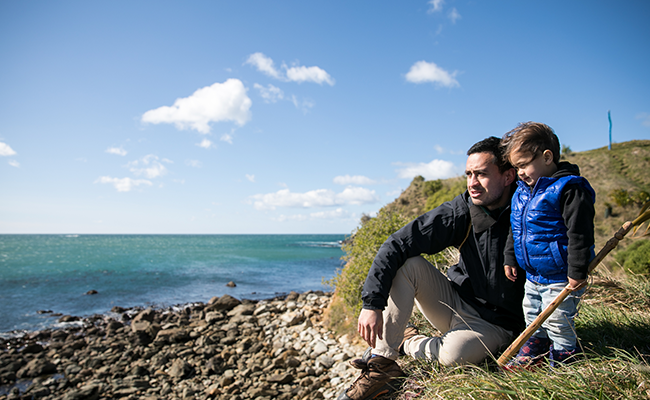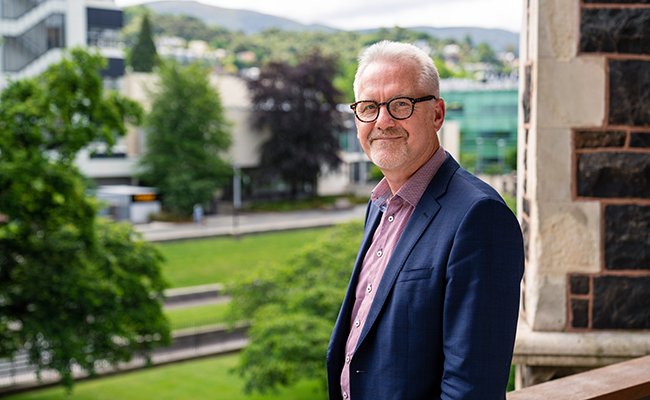
Vision 2040 will guide the University of Otago's path confidently into the future.
Over the next few weeks, the Bulletin is taking a deeper dive into Vision 2040, looking at how the new strategic direction will impact the University. We're asking our senior leaders what they hope the University of Otago will look like in 17 years time. Today we launch this series with the Chancellor, Stephen Higgs, and Vice-Chancellor, Professor David Murdoch.
Chancellor Stephen Higgs - A leading New Zealand and Pacific university

Chancellor Stephen Higgs says decisions need to be made on how to become a Te Tiriti-led institution.
Vision 2040, the new strategic direction for the University of Otago, lays out a shared view of the future for the organisation, Chancellor Stephen Higgs says.
"Extensive consultation has taken place with staff and other stakeholders and those views have very much informed the Vision 2040 document.
“The result is a shared outlook of what we seek to be in the future and what our key priorities are.”
Having this agreed direction enables the University to confidently move forward to support and embed the changes, systems, facilities and “most importantly, the people required to achieve that shared vision”, he says.
The aspirations in the document will require the wider University community to work together as a team.
“At a practical level, very capable management and governance oversight will work closely with staff at all levels to ensure that the Vision and associated strategy and plans are developed and implemented in a collaborative manner.”
The next steps are for the University to consider how to turn the high-level Vision into strategy and into short- and medium-term plans, turning aspiration into action.
“The embedding of the priorities, principles and plans will flow from ongoing communication and discussion with staff, particularly at divisional level.”
Among the conversations to be had and decisions to be made is how to become a Te Tiriti-led institution.
“Like most organisations in New Zealand, we are learning and developing in this crucial area. What that ultimately looks like will be determined in a close relationship with mana whenua and in close consultation with all staff.”
Mr Higgs acknowledges that the world is changing rapidly – the global events of the past three years have made that clear - and “we cannot know what 2040 holds for the University”.
“Vision 2040 was intended to broaden and bring more future-focussed thinking, while recognising what has been and remains successful and valuable from our past.
“The strategy and plans resulting from here will need to be reviewed and updated as time passes, but by keeping our aspirations in sight and being adaptable and innovative, we will be able to achieve this together.”
Mr Higgs' vision for 2040 is for Otago to remain a leading university in the world, with a special character reflecting its place in the Pacific, with clever and motivated staff, producing top-class graduates who have enjoyed a unique and excellent student experience in and out of the lecture theatre.
“I'd expect us to have a focus in our teaching and research on areas that are important to society and in which we excel, and for us to be producing research outcomes which benefit our community, New Zealand, the Pacific, and the world.
“My confident hope is that we remain a leading New Zealand and Pacific university, with facilities, systems and people best suited to the student, employers and society at that time.”
Vice-Chancellor Professor David Murdoch - Connecting with our place in our environment

The whole community will need to work together to achieve the Vision, says Vice-Chancellor Professor David Murdoch.
Vice-Chancellor Professor David Murdoch wants the University of Otago to set itself apart by being truly aspirational in its vision for its own future.
“I want us to step out of our colonial framework, to lead with an honest response to our indigenous population and to connect with our place in our environment.”
In 2040, Professor Murdoch hopes that Otago will greet the 200th anniversary of the signing of Te Titriti o Waitangi as an institution which has a structure that better reflects its partnership with mana whenua.
“I expect to see a greater diversity in our students and staff, and for our student graduates to be well equipped to meet global issues and to be socially accountable.
“I hope we are the go-to place for government agencies to seek advice, and to be distinctive in the courses we offer and the research we undertake.”
Getting to this state won't happen overnight, or without challenges, he acknowledges.
Following the launch of the Vision, staff and students will be encouraged to take part in consultation on how to turn the strategy into action.
A process is being designed for the second quarter of 2023 to gather feedback and consider next steps.
“We can't do this, achieve this, without the whole community working together.”
Professor Murdoch is glad the Vision 2040 document is now available for all to read.
“It's been delayed owing to the interruption of COVID-19, and even now this is an interim version.”
Vision 2040 will be finalised following the renewal of the Memorandum of Understanding between the University and Ngāi Tahu, the university's main Te Tiriti partners.
A key change in the new strategy is the aspiration to be a Te Tiriti-led University.
To do so means substantial change away from Otago's initial colonial framework and working towards one in which the University has a strong partnership with mana whenua, and where there is a safe environment actively supporting Māori staff and students, Professor Murdoch says.
“We acknowledge our community will need support and leadership to action this, and we will bring in resources to achieve it.
“But it is the right thing to do. We are a New Zealand university and for us to show leadership and be early adopters in this space is critical.”
One of the other new perspectives in Vision 2040 is the aspiration for the University and its graduates to be socially accountable.
“Social accountability came out of medical education and is now recognised by the World Health Organisation. Essentially, its being accountable to the people we serve. We are a public institution, and we have a responsibility for the people we represent.
“Being socially accountable means making sure our research is impactful and knowledge is shared; that we interact with our community in research and teaching; and that we are a university in which diversity and equity is a strength we are known for.”
Professor Murdoch is excited to start work on turning the vision into a reality. “There are exciting ideas in here for us to build on.”
